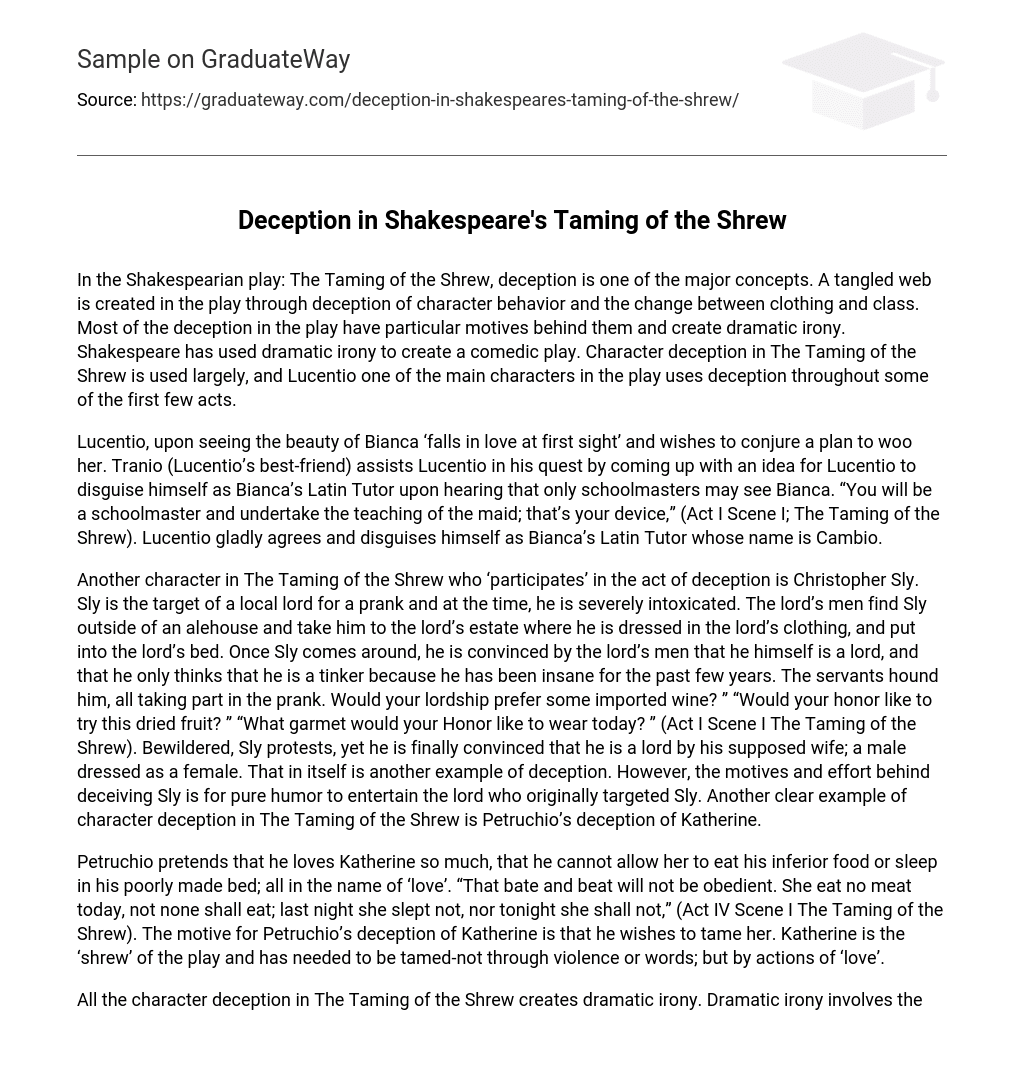In the Shakespearian play: The Taming of the Shrew, deception is one of the major concepts. A tangled web is created in the play through deception of character behavior and the change between clothing and class. Most of the deception in the play have particular motives behind them and create dramatic irony. Shakespeare has used dramatic irony to create a comedic play. Character deception in The Taming of the Shrew is used largely, and Lucentio one of the main characters in the play uses deception throughout some of the first few acts.
Lucentio, upon seeing the beauty of Bianca ‘falls in love at first sight’ and wishes to conjure a plan to woo her. Tranio (Lucentio’s best-friend) assists Lucentio in his quest by coming up with an idea for Lucentio to disguise himself as Bianca’s Latin Tutor upon hearing that only schoolmasters may see Bianca. “You will be a schoolmaster and undertake the teaching of the maid; that’s your device,” (Act I Scene I; The Taming of the Shrew). Lucentio gladly agrees and disguises himself as Bianca’s Latin Tutor whose name is Cambio.
Another character in The Taming of the Shrew who ‘participates’ in the act of deception is Christopher Sly. Sly is the target of a local lord for a prank and at the time, he is severely intoxicated. The lord’s men find Sly outside of an alehouse and take him to the lord’s estate where he is dressed in the lord’s clothing, and put into the lord’s bed. Once Sly comes around, he is convinced by the lord’s men that he himself is a lord, and that he only thinks that he is a tinker because he has been insane for the past few years. The servants hound him, all taking part in the prank. Would your lordship prefer some imported wine? ” “Would your honor like to try this dried fruit? ” “What garmet would your Honor like to wear today? ” (Act I Scene I The Taming of the Shrew). Bewildered, Sly protests, yet he is finally convinced that he is a lord by his supposed wife; a male dressed as a female. That in itself is another example of deception. However, the motives and effort behind deceiving Sly is for pure humor to entertain the lord who originally targeted Sly. Another clear example of character deception in The Taming of the Shrew is Petruchio’s deception of Katherine.
Petruchio pretends that he loves Katherine so much, that he cannot allow her to eat his inferior food or sleep in his poorly made bed; all in the name of ‘love’. “That bate and beat will not be obedient. She eat no meat today, not none shall eat; last night she slept not, nor tonight she shall not,” (Act IV Scene I The Taming of the Shrew). The motive for Petruchio’s deception of Katherine is that he wishes to tame her. Katherine is the ‘shrew’ of the play and has needed to be tamed-not through violence or words; but by actions of ‘love’.
All the character deception in The Taming of the Shrew creates dramatic irony. Dramatic irony involves the reader/audience knowing something about what’s happening in the plot, about which the character(s) has/have no knowledge. Dramatic irony can be used in comedic plays, such as this one to engage the reader/audience. Throughout the play, characters are may be oblivious to recognising the truth, however, the reader/audience can sympathise with this character because the reader/audience knows the true motives of the circumstance. The characters mentioned earlier create examples of dramatic irony.
Lucentio disguises himself as Cambio; Bianca’s Latin Tutor, little does Bianca or Baptista (Bianca and Katherine’s father) know about this deception, the reader/audience may find this situation humorous. Christopher Sly is the subject of deception and dramatic irony. He is the target of a prank, little does he know, yet the reader/audience may again find this humorous. Petruchio deceives Katherine through ‘love’ where it may appear as cruel to Katherine. The reader/audience may also find this method of taming cruel, yet this is still an example of dramatic irony.
Other key points of deception in this play involve the subverting of gender and social roles. When the disguises are put in place, social and even gender roles are mismatched. When Lucentio becomes Cambio, he switches from becoming a university student, to a schoolmaster. When Sly is the subject of deceptive prank, a lowly tinker becomes is a lord. These are examples of the subversion of social roles, however, there is an example of subversion of gender roles especially in this play. When Sly is in the midst of being convinced he is a lord, his ‘wife’ a boy dressed in female clothing finally pushes Sly to believe he is a lord.
And furthermore, in Shakespearian times, men played female roles, as women were not allowed to act. Clearly, in analysis of The Taming of the Shrew, deception is a major concept. A tangled web is created through all of the deception methods such as character deception and subversion of social and gender roles. Dramatic irony is also used to create a comedic sense throughout the play. In the words of a famous author and novelist: “Oh what a tangled web we weave, When first we practice to deceive. ”





